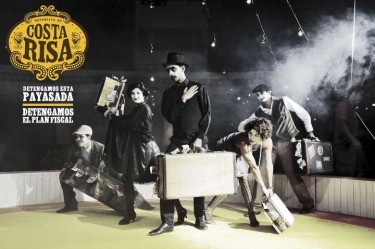A viral video has spread in Costa Rica in the first days of November. It seems to be a high budget production that makes a pun out of the country's name, calling it “Costa Risa” (i.e. “Costa Laughs”).
The video, uploaded to YouTube [es] (with 24,000+ views) compares Costa Rica to a circus, where high taxes, corruption and criminals have their way and laugh at the taxpayer and regular citizen. The campaign is seen as a well funded attempt to influence public opinion using social media.
The government has been working to pass a new fiscal package that has found opposition, especially amongst the private sector. The video, which is released by a group called “República de Costa Risa” [es], is part of a social media and viral communication strategy with webpages, blogs, and Twitter (@RCostaRisa, #costarisa) and Facebook accounts. The group's press communication is signed by Luis Loria, who is a leader of the ANFE [es] (National Association for Economic Promotion), an interest group in Costa Rica.
The video [es] features a circus of sorts called “Costa Risa” and several grotesque clowns that dance and sing to a carnival-like tune. The text of the song claims that the governing class is intended on preserving a status of disorder for their own and their cronies’ benefit:
Costa Risa is my country, and it must be governed like this, theft and poverty a-plenty, a paradise of corruption…
The press release of the “República de Costa Risa” movement [es] communicates that the video and the staged clowns are part of a citizens’ movement to stop the “ransacking” by the government:
La República de Costa Risa es un país ficticio que nace gracias a la iniciativa y apoyo de ciudadanos que rechazan el manejo irresponsable de las finanzas públicas y la intención del Gobierno de Costa Rica de profundizar el saqueo legal de los costarricenses por medio de la aprobación de un nocivo “paquetazo” de impuestos
Blogger Oscar Cruz [es] comments on the big budget necessary to produce the video, and questions its validity as a real product of the concerns of the people. He sees it as a misuse of the values of the country by an interest group that has found common cause with the people, and uses social media to spread a shallow and propagandistic message. The problem is that private capital interests enter the political arena using social media:
Si esto está patrocinado por dinero de conglomerados empresariales es grave; es grave el daño institucional que se hace al imaginario de los costarricenses, de lo que nosotros mismos pensamos de este país. Decir que este país es una payasada de manera tan públicamente publicitaria es un daño increíble a la institucionalidad.
He adds:
[…] esto es incitantemente absurdo, esto busca claramente la empatía del pueblo para amasar una bola de nieve popular que cuestione, que se rebele – […] esto es la viralidad per sé y ese es un objetivo fútil.
José Medrano, founder of Ticoblogger.org, the service that hosts the Costa Risa page, writes in his personal blog [es] that every user may publish any content, without censorship, and that the distribution of content must be open to all, of course excepting Ticoblogger of endorsing any content of the service.
La capacidad de burlarse de sí mismo, o en el caso en especifico de la propia nación, denotan seguridad por sus sentimientos hacia sí mismos o hacia la patria, por lo cual siempre que se busque un efecto positivo en la sociedad debería verse con buenos ojos […] por lo cual muchos en vez de sentirse ofendidos por ser caricaturizados en esta realidad costarrisible, deberíamos tomar alguna acción, aunque sea fiscalizando el actuar político mediante blogs.
He goes on to remark:
Me parece que si estas en contra de los impuestos la campaña te llama a la acción, y en un caso especifico e innovador, te brinda la posibilidad de mediante su página web, hacerle llegar por correo inmediatamente a todos los diputados en tiempo real, por lo que es una excelente oportunidad para hacernos sentir, eso si, de manera respetuosa.
All the while, the Facebook page of the ANFE [es], the organization behind the social media campaign, contains a post [es] comparing the use of the video to a strategy of using representation to unmask the powerful:
El organizar una obra de teatro (un espectáculo musical de Circo, en el caso de la “República de Costa Risa”), que refleje las sospechas de la gente, es un recurso muy válido para descubrir si estas tienen fundamento. Eso es, precisamente, lo que hizo, hace unos 400 años, Shakespeare con “La Muerte de Gonzago”, en Hamlet, para desenmascarar a Claudio.
In a world where activism has merged with social media, all the players involved have a shot at using the medium in the best way possible. Citizen journalists, bloggers, mass media, political parties and politicians, private companies and intellectuals, governments democratic or other: all compete for the same trickle of relevance and impact in cyberspace.
If a group has greater resources at disposal, it does not mean that the virality and vitality of its message is greater. What counts, at the end of the day, is the sense of urgency of the dwellers of a new public sphere that has its own rules of leverage.









2 comments